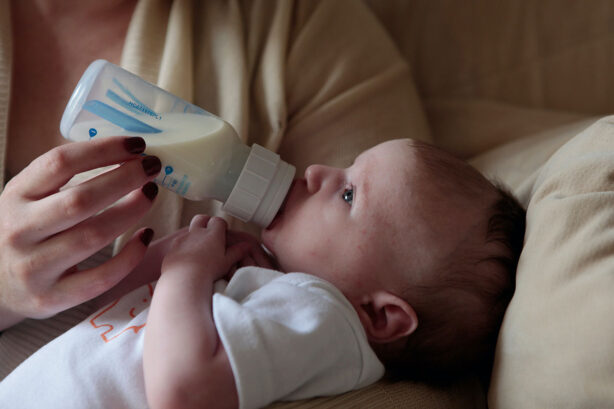Since newborns can’t talk, it can be difficult for parents to know what they are thinking or feeling. If something hurts or bothers them, all they can do is cry.
So, when your baby is crying after every meal or refusing to drink together, it may be time to consider that something about the baby formula is bothering them.

Allergies are common in humans, and there is very little that can be done to prevent them. The only thing we can do is avoid the food that’s causing a reaction.
After mother’s milk, the most popular food for a baby is formula made using cow’s milk. But, a baby could very well be allergic to cow’s milk, or might even be lactose intolerant.
If something about your baby’s behavior indicates difficulty in drinking or digesting cow’s milk, you might need to make the switch to hypoallergenic baby formula.
What is Hypoallergenic Baby Formula?
A hypoallergenic formula for babies is any formula that has proteins divided into smaller proteins, or has gone through the process of hydrolyzation. What this does is make the proteins more digestible and tolerable to your baby’s tummy.
These proteins can come from dairy, but what you give your baby depends on their tolerance. If a baby cannot handle any dairy-based formula, you’ll want to look into a plant-based alternative.
Many common hypoallergenic brands make soy-based formulas that are decent alternatives for regular ones.
However, many babies who are allergic to cow’s milk protein may also be allergic to soy-based proteins, so you have to be careful about what you choose to give them.
Not all formulas that claim to be hypoallergenic necessarily are. Read the label and see how much processing the formula went through.
Only choose formulas that have gone through clinical trials and have been studied on children with allergies. The formula should be tolerated by at least 90 percent of the patients it has been tried on.
There are four main types of hypoallergenic baby formulas:
- Partial Hydrolyzation Formula- The proteins in these formulas have gone through a little hydrolyzation and are often not hypoallergenic. If your baby is truly allergic to baby formula, you should not be giving them these.
- Extensive Hydrolyzation Formula- These formulas have been through extensive hydrolyzation, and the milk proteins have been broken to their smallest units to ensure that your baby can digest them.
- Free Amino Acid Formula- When your baby cannot even tolerate the smallest proteins, they will have to be given free amino acid-based formulas. Amino acids are the building blocks of protein, so it is easier for highly intolerant babies to digest them. These are more expensive but become the only alternative when your baby can’t drink extensively hydrolyzed baby formula.
- Soy-Based Formula- These are soy protein-based formulas, but they might be ineffective for babies who are already intolerant of milk-based protein. According to research, 50 percent of the babies who are cow’s milk intolerant can also show intolerance towards soy protein.

When Should You Give Your Baby Hypoallergenic Formula?
Some parents who don’t have the option of breastfeeding their babies instead give them cow’s milk-based formulas.
However, people with a different lifestyle, such as veganism or vegetarianism, often seek to switch to a plant-based alternative for their children.
It’s important to know that pediatricians strictly advise against this. Unless a baby has been diagnosed with cow’s milk allergy, they should not be given a hypoallergenic formula.
If your pediatrician has recommended that you switch to hypoallergenic baby formula, only then you should change your formula.
Otherwise, breastfeeding is always the best option for a little one, with cow’s milk formula being a solid second choice. If you are looking for a good regular formula, opt for organic baby formulas when possible.
How to Know Whether Your Baby Needs Hypoallergenic Formula
When your baby is allergic to regular formula, you will likely see signs of discomfort in them. Here are a few issues you need to keep an eye out for during the first year of feeding:
Severe Irritability or Fussiness
If you see that your baby has been fed, is not tired, and already had a diaper change, you need to figure out what else might be causing their tears.
If your baby cries extensively for hour and you cannot understand the reason why, this irritability is usually simply referred to as colic.
The most common cause of colic is difficulty digesting formula. If your baby shows extreme irritability and tends to cry extensively, they might be having an allergic reaction to the formula.
Colic caused by an intolerance to cow’s milk may cause extreme abdominal pain. Take your little one to your pediatrician if you can’t find any reason for their fussiness and tears.
Hay Fever-Type Symptoms
If your baby has constant mild allergic symptoms like a runny nose or a cough, it might be due to their formula. Itchiness around the eyes and nose or frequent sneezing can also be a sign of an allergy.
If the baby did not come into contact with anything that could cause an allergic reaction, cow’s milk formula might be the culprit.
If your baby has a blocked nose or consistent trouble breathing, take them to a doctor as soon as possible. Regardless of the cause, you want to ensure your baby is able to breathe comfortably.
Some babies are naturally hyperallergic, which can become deadly when they come into contact with something they cannot handle.
Rashes
Because a baby’s skin is so sensitive, they may often break out in rashes for different reasons. Even a mild cold can cause a rash.
But, if your baby develops rashes or hives directly after drinking baby formula, it’s likely that the formula is the problem.
If a rash lasts longer than a day, visit the doctor to get the cause of the rash diagnosed. Even if it ends up being a simple diaper rash, knowing for sure is worth the visit.
Bloating and Gassiness
Is your baby gassy? Do they tend to be bloated or have smelly flatulence? This might be due to poor digestion of baby formula.
Bloating and flatulence in babies can be key early signs of digestive problems, so check in with your doctor to see if your baby has issues with their digestion.
Vomiting
Spitting up after eating is normal for little ones, but if your baby seems to be vomiting large amounts after each feeding, it may be due to an allergy.
If you’re concerned about the amount of liquid your baby is regurgitating, make sure to check in with your family doctor.
Frequent vomiting can lead to malnutrition and dehydration, so you’ll want to diagnose any issues as soon as possible.
Diarrhea or Constipation
If your baby is having tummy problems, chances are that they will have diarrhea. A hard-to-digest formula can make it difficult for your baby’s stomach to properly digest the liquid.
If there is blood in their stool, it can mean a severe internal reaction, so do take your baby to the doctor as soon as possible.
Some babies may have the opposite reaction and have constipation due to a cow’s milk formula allergy. If you see your baby having difficulty passing stool or crying when having to poop, it might be due to their formula.
Anaphylaxis
Anaphylaxis often happens during the first encounter the baby has with something they’re allergic to. It is a life-threatening allergic reaction that causes their entire body to swell up.
During anaphylaxis, the respiratory organs swell up, and your baby will have difficulty breathing. This is very dangerous, and will require immediate medical attention.

The most important thing to remember is that you should only give hypoallergenic formula to your baby if it’s been recommended by your family doctor.
Choose your hypoallergenic formula well, as some products don’t deliver what they promise, and watch out for symptoms of formula allergy in your baby.
With any luck, any issues your baby has can be solved with a simple switch to a different formula!
